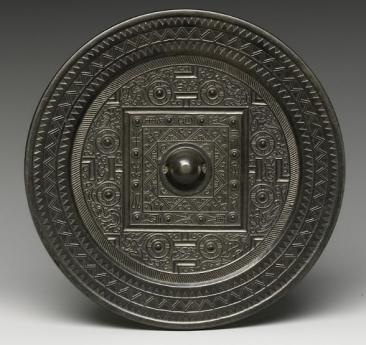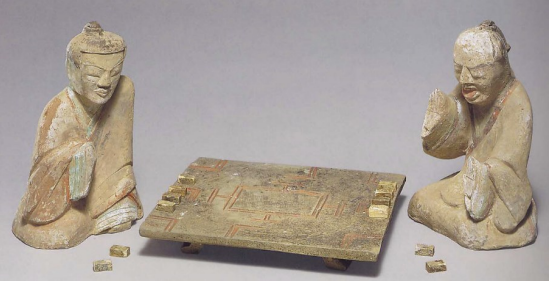4.3: Empresses
- Page ID
- 135115
Sima Qian wrote that “The bond between husband and wife is the most solemn of relationships.” He gave historical examples of how wives had helped dynastic founders, and of how rulers who slighted aging wives to favor concubines had lost their thrones.2 He thought Liu Bang and his wife Lü Exu a fit couple: Both were uneducated and unrefined, prone to cruelty when afraid, but Empress Lü’s strength, resolve, and good judgement had helped Liu Bang establish stability. As they aged, Liu favored Beauty Qi and leaned toward making her son heir apparent in place of Lü’s son, who was younger. In the end, as the son of the primary wife, Lü’s son ascended the throne as Emperor Hui. His mother married Hui to her granddaughter (Hui’s sister’s child), but the couple had no children, and Hui died at 28. Two of his sons by concubines succeeded him, but they were babies. How did the fledgling Han dynasty survive?


Han survived because Empress Lü was the real second Han ruler, from 195 to 180 BC.
Sima Qian wrote a “Basic Annals” recounting the events of her reign. He commented that under her:
the common people succeeded in putting behind them the sufferings of the age of the Warring States, and ruler and subject alike sought rest in non-action (wu-wei). Therefore Emperor Hui sat with folded hands and unruffled garments, Empress Lü as a female ruler conducted the business of government without ever leaving her private chambers, and the world was at peace. Punishments were seldom meted out and evildoers grew rare. The people devoted themselves to planting and harvesting, and food and clothing became increasingly abundant.”3
Empress Lü was a legitimate authority. She was legitimate as wife and partner to her husband, and as mother and generational superior to her son and grandsons. She had earned authority because it was widely recognized that she had helped in the conquest – a family enterprise like any other – and she earned more authority because she ruled well. As ruler, she issued edicts and communiques to foreign regimes in her own name, and stamped them with fine jade seals carved with dragons and tigers – a kind of seal supposed to be used only by the emperor. She openly received officials herself, and got a copy of every report submitted to the emperor. She oversaw some important measures, including lifting the Qin ban on books of political theory, so there could be free debate. Officials of all kinds worked for her, and the government ran smoothly. Nonetheless, she had enemies at court.
When Empress Lü died, her opponents killed almost all her relatives. But her daughter in-law Empress Dou reigned with her husband Emperor Wen, and as regent for her son Emperor Jing, and her grandson Emperor Wu (Wudi). Wudi reigned for 53 years (more on him below), but later emperors were mostly children dominated by their mothers and their mothers’ families, officials, or eunuchs. The Han court was rife with accusations of witchcraft and murderous factional struggle. A clan that lost a bid to provide the empress might well be exterminated. For example, a triumvirate running child emperor Zhao’s government (r.87-74), included Huo Guang. Huo married his daughter to the emperor and packed the upper bureaucracy with his family. When the next emperor chose an empress from a different family, the Huos poisoned her and put in another Huo daughter. In the end, public opinion turned against the Huos, and the whole clan was wiped out.


